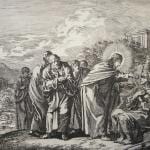
St. Diadochos of Photiki, a bishop-ascetic who participated in the Council of Chalcedon, began his major theological work, “On Spiritual Knowledge and Discrimination: One Hundred Texts,” by telling his readers not only to focus on the three theological virtues, but to center upon the virtue of love:
All spiritual contemplation should be governed by faith, hope and love, but most of all by love. The first two teach us to be detached from visible delights, but love unites the soul with the excellence of God, searching out the Invisible by means of intellectual perception.[1]
The three theological virtues of faith, hope and love should serve as the foundation of our spirituality. Of the three, love is the greatest and most important. Indeed, we can say that faith and hope flow out of love. For through our love for God, we grow closer to God, getting to know him better. As we know him better, we trust him more and, for we will realize that he constantly works for our own good. And if God is for us, we have reason to hope that, as Julian of Norwich says, all things will be well.
It is our love for God which allows us to see and experience God for who he is: the God who is love. Love opens up to love and sees all things in that love. If we want to understand the world around us, if we want to understand the metaphysical truths which lie behind the physical reality which we experience, we must examine all things in and through the lens of love. God reveals himself in creation, but to discern the fullness of his revelation, to see him in all things, we must look at and contemplate all things with the right hermeneutic. There are many which are available, each which will provide us some insight into God. But the greatest of all is love. It encompasses all that the other hermeneutics can provide but it also takes us closer to love, because it uses God’s very own love to perceive and come to know him.
While detaching ourselves from visible delights, we must not deny the physical world and its value. The incarnation serves to verify the goodness of all creation, including and especially, the material world. Jesus, the God-man, took on the whole of humanity, and with humanity, the whole of the physical creation unto himself. The eschaton became immanent. However, he shows us that we are not to be limited to a materialistic view of the world, to a materialistic way of life. We must join heaven and earth, the visible and the invisible, letting them become one.
Just as we should not become too attached to a materiality without spirituality, we must not become overly attached to things of the spirit that we ignore or deny our physicality. For if we deny the material side of our personal existence, we deny the value of matter and with it, the purpose of the incarnation itself. Chalcedon shows us that Jesus is both man and God, so that in his humanity, he is completely man. If had undermined his physical nature and denied its value, he would have undermined his humanity. Thus, though it is important to remember the greatness of our spirit, and its potentiality, to attach ourselves to it in such a way as to deny our material needs (or the material needs of others) is to undermine the Christian faith (which is why when various Gnostic groups suggested such an end, Christian leaders consistently denounced them, focusing on the incarnation as the proof of their error).
Thus, Diadochos writes, “Evil does not exist by nature, nor is any man naturally evil, for God made nothing that was not good.”[2] Nothing in nature is, in itself, evil. Rather, evil is found in the corruption of nature. It leads us to have an imbalanced attachment to some element of creation over and apart of the rest.
Denying the common good leads to evil because it promotes individualized private goods over the good itself. But we can talk about the common good, both within society, but within the person as well. Personal sin is the denial of the holistic good of the human person. Asceticism is meant to teach us ways we can overcome that imbalance; where we have become addicted to some private, separated good, so that we neglect the fullness of the good, we have to exercise ourselves and our actions in such a way as to overcome that addiction. If we are gluttons, we must learn how to fast, so that the good of eating is once again normalized.
This means that if we are overly attached to spiritual goods, we neglect the fullness of the good itself. We must detach ourselves from our unhealthy spirituality and perform works which help us properly reorient ourselves to the fullness of the good. Christianity, when it neglects the value of the material world. Then overly spiritualized piety lead people into living out terrible lives, where earthly suffering is not only ignored, but openly promoted. The end result is that outright abuses are ignored because they are seen to hold no spiritual significance. Without a proper, and healthy, promotion of corporeal works of mercy and justice, Christians can become too attached to their own private spiritual pleasure that they end up destroying not only themselves through their prelest, but many others because they end up believing this is what Christianity is all about and reject it. Thus, “Faith without works and works without faith will both alike be condemned, for he who has faith must offer to the Lord the faith which shows itself in actions.” [3]
We should live out our faith by founding it and grounding it upon love. Love for God leads us to union with God, but that union should bear spiritual fruit. It should lead us to follow after Christ himself, who, being the nature of God, emptied himself of all his divine glory to become man, so that he can restore fallen creation. His love for the world shows God did not reject the world, and neither should we. We must always bear all things for the glory of God in the world in the light of love. We should not seek out suffering: those who seek to be martyrs are not true martyrs, but prideful zealots. Nonetheless, we should likewise bear with burdens when it is necessary, especially when we do so for the benefit of others. Through an authentic spiritual vision, one generated by love, we are open to the grace of God which makes it possible for us to achieve this. And so, we must realize, through love, we are capable of creating the harmony within ourselves and within society at large which is necessary if we want to overcome the harm caused by sin.
[1] St. Diadochos of Photiki, “On Spiritual Knowledge and Discrimination: One Hundred Texts” in The Philokalia: The Complete Text. Volume One. trans. G.E.H. Palmer, Philip Sherrard, and Kallistos Ware (London: Faber and Faber, 1983), 253 [#1].
[2] St. Diadochos of Photiki, “On Spiritual Knowledge and Discrimination: One Hundred Texts,” 253 [#3].
[3] St. Diadochos of Photiki, “On Spiritual Knowledge and Discrimination: One Hundred Texts,” 258 [#20].
Stay in touch! Like A Little Bit of Nothing on Facebook.
If you liked what you read, please consider sharing it with your friends and family!












